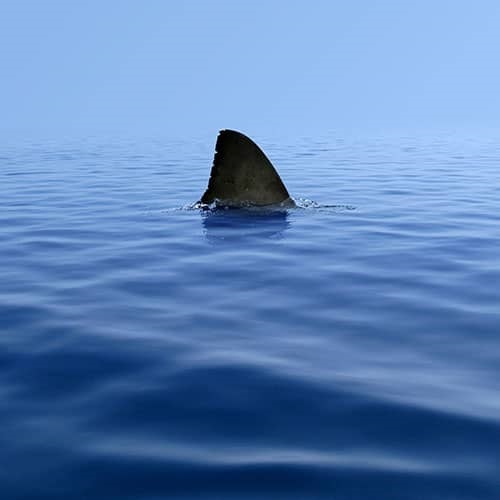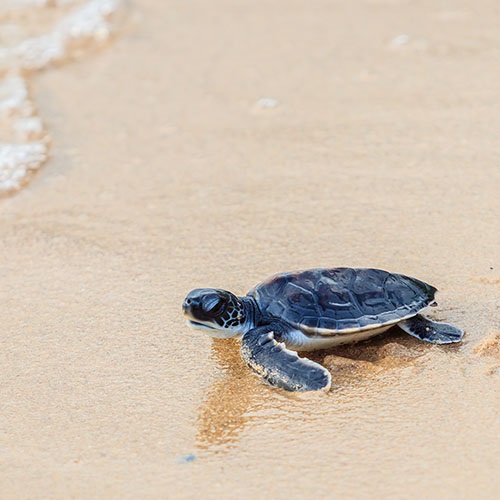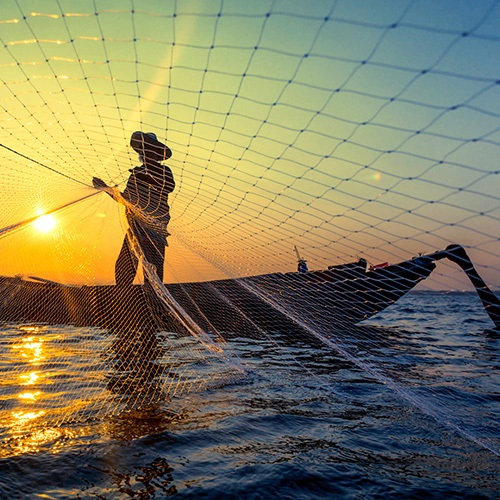Sharks provide a valuable source of protein for many communities around the world. They are important predators that help keep marine ecosystems in balance. This means sharks must be fished sustainably in order to maintain a healthy ocean.
What are sharks?
Sharks belong to a group of animals called the elasmobranchs that have evolved over hundreds of millions of years. Unlike most fish which have skeletons made from bone, a shark's body is made up of cartilage, like the material in our ears and nose. There are more than 500 species of shark in the world's oceans, ranging dramatically in size, from whale sharks reaching 18m in length to the dwarf lantern shark at just 20cm.
Why are sharks important?
Despite our often unfavourable opinion, humans are much better off with healthy shark populations than we are without them. Sharks are a top marine predator which means they have almost no predators that eat them. They play an important role in the marine ecosystem keeping populations in check by predating on the sick, the weak, the old and the dying. Predators help ensure only the fittest survive, placing natural selection pressures on their prey.
Without them, populations of species lower down the food chain can grow too big, placing increased pressure on the other animals they feed on. Sharks help keep the food chain balanced. A well stabilised ocean food chain in turn provides food for billions of humans and jobs for hundreds of millions.
Watch our interview with Dr David Shiffman: Why Sharks Matter >
International trade in and consumption of sharks
Sharks are an essential marine resource that has become the main livelihood for some communities around the world as well as a source of local protein. The top five biggest shark fishing nations in the world are Indonesia, Spain, India, Mexico and the USA. Sharks are harvested primarily for their meat and fins but have also been targeted for their skin, cartilage and liver. The value of the world trade in shark commodities approaches nearly USD$1 billion per year.
Though shark fins are often destined for countries in the East and Southeast Asia such as China or Hong Kong, the largest consumers of shark meat are found in South America and Europe. The biggest importers being Italy, Brazil, Uruguay and Spain. North American, Italian and French markets typically consume dogfish species. Dogfish are often used in the popular dish Fish and Chips throughout Europe.
The impact of shark finning
Shark fishing supports many livelihoods and economies around the world. But there are those that undermine the hard work of responsible fisheries by engaging in illegal fishing activities.
Illegal fishing includes fishing in waters or for species that vessels are not licensed for. Illegal, unreported and unregulated (IUU) fishing for sharks not only leads to their decline but can also impact other valuable legal fisheries by changing ecosystem dynamics.
Some vessels may also engage in the practice of shark finning. This is the abhorrent practice of removing a shark's fin at-sea before discarding the carcass overboard. Sharks drown as a result of this as they can no longer swim and breathe. Shark finning is prohibited in MSC certified fisheries. Shark finning is illegal in many countries, with recent MSC-commissioned research finding 21 out of the top 43 shark fishing nations have bans in place.
The presence of fins in a commercial fishery however does not automatically mean finning is taking place, as there is also a legal trade in fins. When a shark is brought to shore and has its fins removed later, this is not categorised as shark finning.
Shark fins can be provided to the marketplace without finning having taken place. For example some shark fisheries may process sharks aboard for efficiency if they need to land fins and meat in separate ports. This means the sharks cannot be landed with their fins still attached. Spain was the leading supplier of regulated shark fins to Hong Kong in 2008.
Can shark fishing ever be sustainable?
Yes. Sustainable fisheries for sharks are possible. Experts overwhelmingly support improved fisheries management as a solution to the unsustainable overfishing that threatens many shark species. Many also argue that, where possible, sustainable fisheries for sharks should be the goal of shark conservation rather than bans on shark fishing.
Threats to sharks reported in the media can misguide the public. This may lead to a misunderstanding that sustainable shark fisheries cannot exist or that shark finning is the only major cause of shark mortality. However other threats less widely reported on, such as targeting sharks for the meat trade or overfishing may be much more prominent. This is worrying as public opinion often shapes policy and complete bans on shark fishing may not achieve the desired goal.
While overfishing is a big problem worldwide, sustainable shark fisheries may exist and have been recognised by both consumer and industry-facing literature. One such fishery—the largest shark fishery in the United States - is for spiny dogfish, a smaller species of shark that can grow to be three to four feet long and is often found in large schools along the east coast of the US. This fishery accounts for about 85% of the US shark fished by volume, with the US Atlantic spiny dogfish, winter skate and little skate fishery being MSC certified as sustainable. The National Oceanic and Atmospheric Administration’s (NOAA) FishWatch program also notes that "US wild-caught Atlantic spiny dogfish is a smart seafood choice because it is sustainably managed and responsibly harvested".
If we want healthy oceans, with all the economic benefits that come from well-managed fisheries, we need healthy shark populations. Humans - and fish - are better off with waters teeming with healthy shark populations than we are without them.
How does purchasing MSC labelled seafood support sharks?
By choosing to purchase MSC labelled seafood, consumers help recognise and reward fisheries who are acting responsibly. The MSC's requirements on shark finning aim to incentivise transparency and deter illegal, unreported or unregulated (IUU) fishing from occurring.
Sharks can also be subject to seafood fraud or mislabelling. Seafood sold with the MSC blue label is part of a supply chain which has traceability checks in place that ensure the product comes from certified fisheries. The MSC carries out random DNA traces to test that seafood is labelled with the correct species.
Sharks can also be vulnerable to bycatch; the unwanted capture of animals when fishing. MSC certified fisheries must ensure they are minimising their impact on the wider marine environment which includes mitigating any interactions with endangered, threatened or protected species.
Furthermore around 5% of our annual royalty fees are reinvested back into our Ocean Stewardship Fund, which supports shark conservation. The fund helps accelerate fisheries’ improvements by conducting scientific research. Projects funded in 2020 are investigating how to reduce impacts to species like the Greenland shark.
Find out more

Ending shark finning
The MSC is committed to playing its part in eliminating shark finning.

Endangered, threatened and protected species
The MSC ensures that certified fisheries allow the recovery of all endangered, threatened and protected species.

Ocean Stewardship Fund
The Ocean Stewardship Fund aims to increase the number of sustainable fisheries worldwide, by funding innovative research and supporting fisheries at all stages on the path to sustainability.
